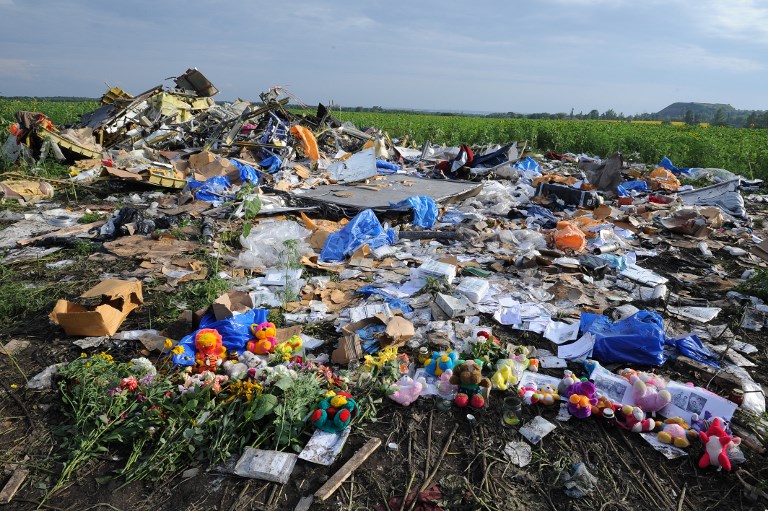When Iran on Jan. 11 finally admitted that its missile downed a Ukrainian passenger plane three days earlier, many in Ukraine must have had the same thought: Will Russia ever do the same?
Iran did the right thing. It hardly deserves a round of applause for taking responsibility after overwhelming evidence made the denials unbelievable, but at the end of the day, they admitted they shot down a passenger plane.
This admission highlighted the fact that Russia has never taken responsibility for an even worse crime that it committed in 2014, when its military downed a Malaysian Airlines MH17 flight over eastern Ukraine, killing all 298 people on board.
The two crashes were similar. In both cases, military personnel shot missiles — presumably, by mistake — at passenger planes. Both missiles were Russian-made. Both attacks were committed by the military forces governed by authoritarian regimes. Both killed hundreds of innocent people — 474 victims together.
But three days after the Tehran attack, Iran fessed up. In contrast, five years after Russian forces downed MH17, Russia categorically denies its involvement and has obstructed the investigation.
Russia keeps doing so despite the clear evidence pointing to its guilt. Thanks to open-data investigators like the Bellingcat team, we know specifically which Buk rocket launcher was used to down the plane, the names of the soldiers who likely operated it, and how the launcher was hastily moved back into Russian territory after the attack. In June, investigators officially charged Russian citizens for the attack.
If anything, Russia confirmed its involvement even further this September, when during a prisoner exchange with Ukraine it demanded to get Volodymyr Tsemakh, a Ukrainian militant who said he helped hide the Buk launcher after the MH17 attack. Russia wanted Tsemakh above all, making him the key condition for the exchange to happen. What was it, if not a de facto confession that Russia shot down the Malaysian Airlines plane and wanted to hide the truth about it?
Russia not only denies it shot down MH17, but blames Ukraine for the attack. In the weeks that followed the crash, its state media created fake reports, interviewing people who claimed they saw a Ukrainian fighter jet strike the plane.
Russia’s continuous denial of responsibility for the MH17 tragedy is an insult to the global community.
It is also a test of the global community’s ability to stand united and call Russia to account. This is a test that is failing so far. The latest manifestation of failure came on Jan. 11, when German Chancellor Angela Merkel called to finish the construction of the Nord Stream 2 pipeline. The construction is paused, due to U.S. sanctions aimed to give leverage to Ukraine, which will suffer economically when Russia launches the pipeline. Yet Germany sides with Russia. One wonders if Merkel remembers that there were three German citizens on board of the MH17.
It is telling that Russian officials made statements in support of Iran in the past few days.
Before Iran admitted it shot down the plane, a deputy foreign minister of Russia criticized the Western governments’ accusations of Iran, saying they were “appalling.” After Iran came clean, a Russian lawmaker, a member of Russian President Vladimir Putin’s party, said that Iran should blame the U.S. for the tragedy.
It appears that authoritarian states are better at standing up for each other than the free ones.
Russia should admit what the world already knows — that its military downed a passenger plane on July 17, 2014, while illegally being on the territory of the neighboring state, Ukraine, leading a proxy war against it. Russia should accept full responsibility and pay compensation to the families of the victims.
When Ukraine accidentally shot down a Russian passenger plane bound for Israel during a defense exercise in 2001, it accepted responsibility and paid compensation. Iran will now be doing the same. Russia must do it, too — better late than never.
For as long as Russia goes scot-free for the downing of the MH17, no civilian planes are safe while flying anywhere near its borders.
As for Iran, Ukraine should demand full admission of guilt from the Iranian authorities and a complete investigation into the circumstances behind what Tehran’s leaders call “human error.” Saying that they hit a passenger plane “unintentionally” doesn’t do justice to what happened.
Ukrainian aviation lawyer Andriy Guck was right when he said, citing the position of other Ukrainian lawyers working on the MH17 case: There is no such thing as an “unintentional” attack on a passenger plane. Military shooting at an aircraft without being able to tell a passenger plane from a missile is de facto the same as an intentional attack on a passenger plane.



